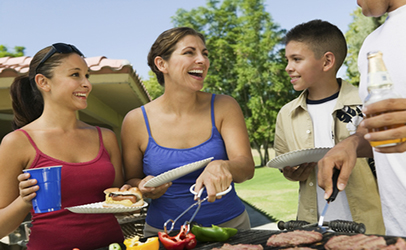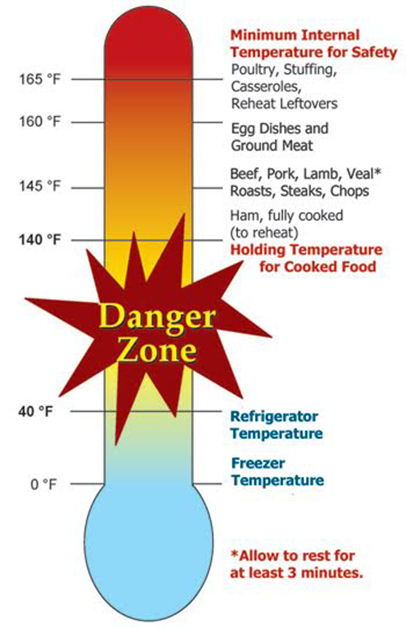 In honor of Labor Day, many people in the U.S. will share good company, fun and food. Unwanted guests can crash the picnics and parties, though, if hosts don’t pay attention to food safety basics.
In honor of Labor Day, many people in the U.S. will share good company, fun and food. Unwanted guests can crash the picnics and parties, though, if hosts don’t pay attention to food safety basics.
Most foods that are prepared for outdoor gatherings are not properly cooled, according to public health officials. Not cooling just-cooked food quick enough allows harmful bacteria to multiply rapidly. Once cooked food has been properly cooled, it should be placed in a shallow container for immediate refrigeration until it is packed for transportation.
 Commonly forgotten, cutting through the peels and rinds of fruit, such as apples or melons, can transfer bacteria into the flesh of the fruit. All fruits and vegetables to be served raw should be washed before they are cut. The cut produce should be refrigerated in waterproof containers or plastic wrap to cool down before going into the picnic cooler.
Commonly forgotten, cutting through the peels and rinds of fruit, such as apples or melons, can transfer bacteria into the flesh of the fruit. All fruits and vegetables to be served raw should be washed before they are cut. The cut produce should be refrigerated in waterproof containers or plastic wrap to cool down before going into the picnic cooler.
Once foods reach their destination, they are often left to sit out in warm temperatures for too long. It’s a good idea to put coolers in the passenger area of a car rather than the trunk, where temperatures are usually higher. Once the cooler reaches the picnic site, place it in the shade with a blanket over the top and keep the cooler closed until it’s time to eat.
Cold foods should be kept cold, and hot foods should be kept hot to reduce the chance of bacteria and other pathogens multiplying. Ice and frozen gel packs are a necessary addition to coolers and insulated storage containers. To keep foods hot, the USDA recommends filling heat-safe, insulated containers with boiling water. After letting the boiling water stand for a few minutes, empty it out, and replace with hot soup, chili, or stews. These containers should remain closed or covered until it’s time to eat.
The more hands that handle the hamburgers, hotdogs, salads and other foods, the more possibility for contamination. People that handle food from preparation to plate should always thoroughly wash their hands to avoid the spread of bacteria. If running water is not available at your outdoor meal, hand sanitizers and paper towels can be used, but they are not as effective.
Utensils and dishes should be plentiful to avoid cross-contamination from preparing meat, poultry or fish on the same dish before and after cooking. Disposable plates and utensils are a great option if dishes cannot be washed in between preparation and completion of cooking.
Cooked food should be kept on a lit grill or eaten within an hour of cooking. Leftovers should be put away as soon as possible, and should not exceed one hour. If ice melts or gel packs become luke-warm in coolers, throw the food out.
(To sign up for a free subscription to Food Safety News, click here.)
